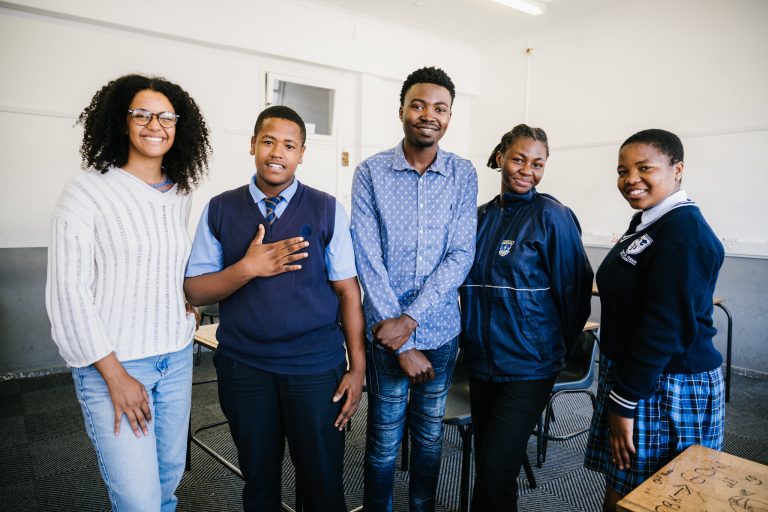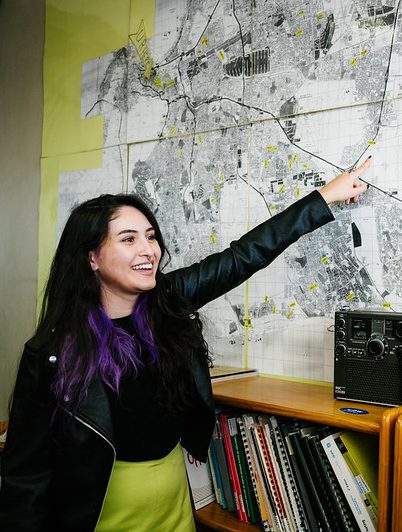RESOURCES
2024-03-13
How To Recover From Academic Burnout
Getting your education is an incredibly rewarding experience, but it can also be demanding and tiring—so much so that most students also experience some level of academic burnout.
Published by Tilting Futures

Academic Burnout 101

Getting your education is an incredibly rewarding experience, but it can also be demanding and tiring—so much so that most students also experience some level of academic burnout. Academic burnout is a common phenomenon among students and professionals who have been pursuing their education for a long time. It’s a state of emotional, physical, and mental exhaustion that occurs as a result of prolonged stress and pressure, especially when you aren’t able to rest enough.
All students have a limit, and even though academic burnout is common, you don’t have to lean into the stress. Recovering from academic burnout is crucial for maintaining your mental and physical health so that you can achieve your long-term goals. To avoid running yourself into the ground, this article will explore the causes of academic burnout and provide the best strategies for recovery so you can enjoy the best experience that education can offer!
Understanding the Causes of Academic Burnout

If you want to restore your health after dealing with academic burnout, you have to understand how academic burnout works, which is possible when you know the causes of this kind of excessive stress.
Often, burnout is a direct result of an overwhelming change in your life, such as illness, a job change, or a new and intimidating assignment. Other times, burnout is due to a lack of planning or organization, overcommitting to an unrealistic workload, or not setting boundaries with yourself and others. Here are some of the most frequent points of stress and burnout for students.
Overloading of responsibilities
A common culprit for burnout is overworking yourself because you have too many tasks and mental burdens. This can cause anxiety, doubt, stress, and a lack of confidence, which is the perfect environment for burnout. Having too much to do can paralyze you, so instead of getting something done you get nothing done, which only adds to the fire.
Lack of motivation
It’s possible that you are tired and detached from your studies, which can make you feel uninterested, unmotivated, and even incapable of accomplishing your goals. Especially if you’ve been in school for a long time, tasks can become monotonous and you can lose sight of your end goal—sometimes, that finish line feels so far away that you start to wonder if it’s even worth it. These feelings can lead to being inactive and irritable with your school life, which leads to feeling unmotivated and burning out.
Stress from high expectations
Many people are extra hard on themselves, and when assignments, tests, and even time management don’t go exactly as planned, it’s easy to be self-critical and get discouraged. Failure can be frustrating, but it’s really just a part of the learning process—and unrealistically high expectations can cripple the learning process by leaving no room for failure.
Not meeting your own expectations or the expectations of others is exhausting, especially if you look at your efforts and never see anything good enough unless it’s perfect. Whether it comes from yourself or the social pressure of others, not meeting expectations may be causing you to overburden yourself, dislike your work, avoid a challenge, and burn out.
Strategies for Recovery

The key to mastering academic burnout is to catch the causes early on and know when to pivot so that you can avoid or recover from the burnout, which enables you to continue becoming the confident and educated individual you want to be. Burnout doesn’t need to control your life or your direction, so the following strategies will show you how to recover from academic burnout so you can feel like yourself again.
Identifying warning signs
If you really want to prevent or recover from burnout, you have to learn how to notice signs and symptoms, especially the ones you know you are susceptible to. You know something is off if you aren’t enjoying and living your typical life or if your normal schedule is overwhelming and unmanageable. Some of the most common signs of academic burnout are:
- Having a lack of confidence in your abilities
- Being unmotivated to do the basics, even in your personal life (such as chores or talking with friends and family)
- Always being tired, even after a good night’s rest
- Skipping class or your typical study sessions
- Procrastinating school work or other responsibilities
- Having little interest in your hobbies or free time activities
Be honest with yourself and admit when you are off of your game—that’s when real healing begins and you can figure out how to deal with school burnout.
Taking breaks
Any athlete will tell you that rest and recovery are just as important as their intense workout routines or practices. The same goes for academic pursuits—you have to learn when to push and when to stop and rest so that your body and mind can reach your long-term goals.
Plus, “breaks” don’t have to mean “doing nothing” or being stagnant. It usually just means trying a change of pace or scenery. Maybe you need a new schedule where you take breaks more frequently throughout your day; or maybe you need to take a break from the classroom altogether if it means that you can get your degree without burning out halfway through. Bigger breaks like this often look like taking a gap year or gap semester, such as participating in Take Action Lab, an immersive learning program by the nonprofit Tilting Futures.

Take a meaningful gap term abroad
See how Take Action Lab could align with your goals.
Re-evaluating goals
The truth is, no one can do it all perfectly! You will have to pick and choose what you can get done, what you excel in, and how you spend your time, so the best thing you can do is determine what matters most to you. What is really important to you in the long run? By establishing your real desires, it becomes much easier to prioritize your daily, weekly, and even annual goals.
Reducing stress
Prioritize self-care and your well-being, and remember that while schooling is designed to be challenging to help you grow, it’s also supposed to be an enjoyable and enriching experience. This part of life isn’t meant to be rushed or stress-inducing to the point of exhaustion or illness. Say no when you need to, practice self-awareness, and remember what is most important—let the rest of it go.
Incorporating exercise and healthy habits
Being a student is a hard gig even when you are feeling good, so if you aren’t giving your body the rest, nutrients, and exercise that it needs, it will be much harder to stick with school. Prioritize sleep, even if your peers normalize getting little sleep at night. Go for walks, practice meditation, eat well-rounded meals, and get a moderate amount of exercise when you can. This is all a part of self-care, which you deserve no matter what phase of life you are in.
Finding a healthy work-life balance
Make sure you are spending time doing activities outside of classwork! This could mean finding opportunities to be social, working on a passion project, calling a family member, engaging with a favorite hobby, watching a favorite movie, volunteering, or any other activity that pulls you away from student life for a little while.
Implementing the Recovery Plan

Implementing a recovery plan is the next step in the process, so get organized, create a schedule, and set goals that will help you stay motivated and on track. This is what you can do:
- Making changes as needed. You may not nail the perfect schedule the first time, but no rule says you can’t adjust your plans. Be flexible and willing to redefine your goals as needed.
- Overcoming obstacles. All goals are met with some resistance, so you can’t expect there to be zero obstacles, even with a really great plan in place.
- Dealing with feelings of guilt. As much as you can, remind yourself that recovering from academic burnout takes time and that you can optimize your efforts instead of feeling shame about your limitations.
- Finding support. Allow others to help you and create a system of support with friends and family you trust. They can remind you of what is most important, keep you accountable for your goals and commitments, and encourage you when you feel down or discouraged.
- Staying motivated. Finally, stick with the habits that make you feel inspired. If you need to spend time each week doing something creative and not school-related, do it. If you need to take a big break and spend more time recovering outside of class, do it. If you need to create a reward system that energizes and incentivizes you, do it!
Defeat Academic Burnout with Take Action Lab
 Figuring out how to recover from burnout as a student can take time, but it’s worth the effort and self-awareness. Anyone can experience academic burnout and there is no shame in slowing down, taking a break, or readjusting your life to better suit the needs of your mind and body. In fact, it’s more responsible to recognize when schoolwork is burning you out, which can do long-term damage to your motivation, drive, and desire to get your education. Recovering from academic burnout is crucial for maintaining your mental and physical health so you can endure the difficulties, enjoy the successes, and ultimately realize your dreams.
Figuring out how to recover from burnout as a student can take time, but it’s worth the effort and self-awareness. Anyone can experience academic burnout and there is no shame in slowing down, taking a break, or readjusting your life to better suit the needs of your mind and body. In fact, it’s more responsible to recognize when schoolwork is burning you out, which can do long-term damage to your motivation, drive, and desire to get your education. Recovering from academic burnout is crucial for maintaining your mental and physical health so you can endure the difficulties, enjoy the successes, and ultimately realize your dreams.
If you really want to enrich your academic experience and reduce burnout, we recommend recovering from academic burnout by traveling abroad with Take Action Lab! Not only can you have some of the most amazing experiences by immersing yourself in a new culture, but you can also continue to progress in your education.
You can take a break from the classroom, get hands-on experience advancing global issues you care about, become part of a community of young changemakers, take time to learn about yourself and your passions, work with world-class mentors, and so much more. If you’re ready to start feeling like yourself and reignite your passion for education and growth, learn more about Take Action Lab today!


